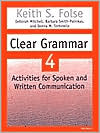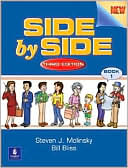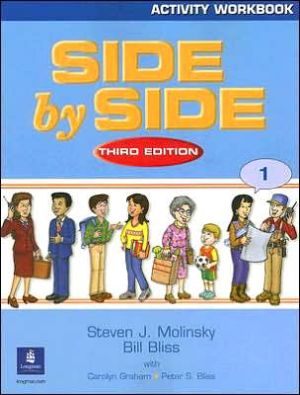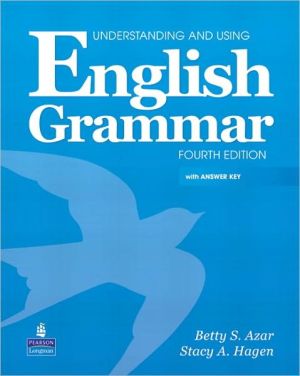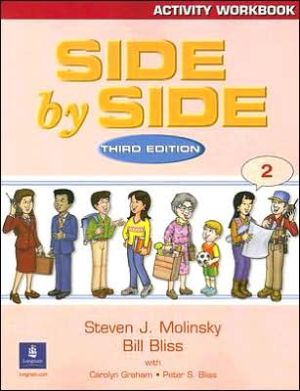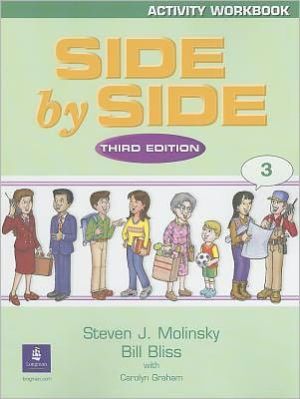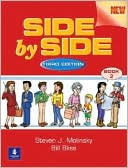Clear Grammar 4: Activities for Spoken and Written Communication
Clear Grammar is a four-book grammar series for students at the beginning, high-beginning, low-intermediate, and high-intermediate levels. The Clear Grammar series teaches basic grammatical concepts, provides ample speaking and writing practice in grammatical structures and at varying cognitive levels, offers opportunities for students to check their progress while studying grammatical structures, and serves as a grammar reference that is written with language and terms that beginning...
Search in google:
Clear Grammar is a four-book grammar series for students at the beginning, high-beginning, low-intermediate, and high-intermediate levels. The Clear Grammar series teaches basic grammatical concepts, provides ample speaking and writing practice in grammatical structures and at varying cognitive levels, offers opportunities for students to check their progress while studying grammatical structures, and serves as a grammar reference that is written with language and terms that beginning students can understand without teacher assistance.Lessons focus on one specific grammar point and include grammar presentations, lists of potential errors with corrections shown, written exercises, speaking activities, multiple choice exercises, and review tests.Book 1 (beginning/high-beginning): the verb to be, regular verbs, possessive adjectives, demonstrative adjectives, past tense of to be and regular verbs, wh- questions, word order, present progressive, count and noncount nouns, prepositions.Book 2 (high-beginning/low-intermediate): articles, to be + going to, past tense of irregular verbs, how questions, frequency adverbs, object pronouns, one/other, the possessive, words that compare, modals, problem words.Book 3 (low-intermediate/intermediate): two-word verbs, past progressive, present perfect, problematic time words, adverbs of manner, too/for, adjectives, used to, infinitives, gerunds, adverbs of purpose, sentence connectors, relative clauses.Book 4 (high-intermediate/low-advanced): past perfect tense, word forms, conditionals (if clauses and wish), adverb clauses, noun clauses, reduction of adjective and adverb clauses, past modals, subject-verb agreement, review of prepositions, and review of verb tenses.The workbook listed with each textbook is the companion workbook, designed to accompany and supplement the textbook as extra practice. Only the textbooks include the grammar instruction.To determine which level is right for your students, try the online placement test.
To the TeacherviiUnit 1.Review of Book 31Phrasal verbsPast progressive tensePast participle formsAdverbs of manner and related termsPrepositions after verbs and adjectivesPassive voiceRelative clausesInfinitives and gerundsConnectorsVERB + direct or indirect objectUnit 2.Past Perfect Tense19Form: had + PAST PARTICIPLEQuestion formPast perfect progressive tenseNegative formUnit 3.Word Forms33Verb endingsAdjective endingsAdverb endingNoun endingsUnit 4.Conditionals: If Clauses and Wish48The grammar of conditionalsReal conditions in the present and futureUnreal conditions in the present and futureUnreal conditions in the pastProgressive forms and mixed conditionalsSentences with wishUnit 5.Adverb Clauses67The grammar of adverb clausesAdverb clauses of timeAdverb clauses of reasonAdverb clauses of oppositionAdverb clauses of direct contrastAdverb clauses of conditionAdverb clauses of placeAdverb clauses of resultAdverb clauses of purposeAdverb clauses of mannerUnit 6.Noun Clauses90Noun clauses: form and functionUsage 1Noun clauses as embedded statements--that clausesUsage 2Noun clauses as embedded questions--wh- or yes-no clausesUsage 3Noun clauses following be + ADJECTIVEUsage 4Noun clauses as subject of the sentenceUsage 5Noun clauses to stress importance or urgency (subjunctive mood)Usage 6Noun clauses in reported speechSequence of tensesReported questions and requestsReview of punctuationUnit 7.Reduction of Clauses122Reduction of adjective clauses (including appositives)More (advanced) reduction of adjective clausesReduction of adverb clausesPrepositional phrases as reductions of adverb clausesUnit 8.Past Modals139May have, might haveCould, be able to, could haveWould, used to, would haveShould have, ought to haveHad to, must have, had to haveBe supposed to, be going toUnit 9.Subject-Verb Agreement158Singular and plural subjects and verbsIntervening: with, along with, in addition to, as well as, includingCompound subjects + each/everyPronouns -one, -body, any-, either, neitherOr, nor, either ... or, neither ... norCollective nounsNouns plural in form but singular in meaningThere/here and inverted word orderWho, which, that as subjectSubjects that are titles and example wordsUnit 10.Review of Prepositions175Time and space: at, on, inPossessive: ofAdverbs of manner: by, withTo, in order to vs. forVERBS + PREPOSITIONSAdjectives + PrepositionsAdjectives/Participles + Prepositionsidioms (throughout the unit)Unit 11.Review of Verb Tenses189Regular verbs vs. irregular verbsOverview of verb tensesThree principal parts: base, past, past participleSimple tenses: present, past, futureProgressive tenses: present, past, futurePerfect tenses: present, past, futurePerfect progressive tenses: present, past, futureUnit 12.Review of Book 4216Past perfectWord formsConditionalsAdverb clausesNoun clausesReduction of adjective and adverb clausesPast modalsSubject-verb agreementPrepositionsVerb tense reviewAnswer Key227Index239Index to Books 1-4243Final Test249Diagnostic Test253
